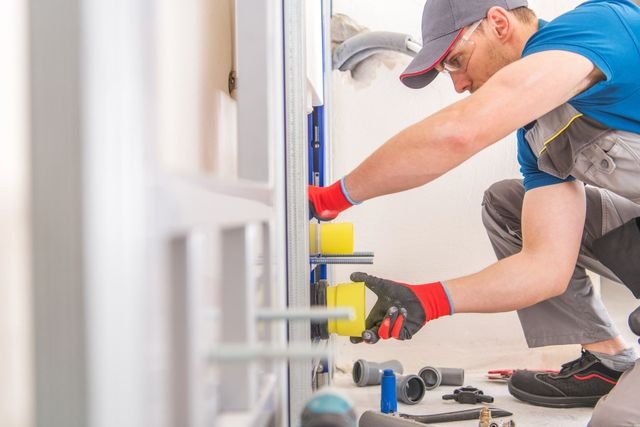In the world of business, unexpected expenses can wreak havoc on budgets and profitability.
One area where costs can quickly spiral out of control is plumbing maintenance and repairs. However, by implementing preventative maintenance strategies, businesses can reduce the likelihood of costly plumbing issues arising.
In this article, we will explore a comprehensive guide to preventative maintenance tips that can help businesses minimize plumbing costs and ensure smooth operations.
Proactive measures can significantly reduce the risk of plumbing emergencies and costly repairs. By following these preventative maintenance tips, businesses can save money in the long run and maintain a functional plumbing system.
Regular Inspections:
Regular inspections of your business’s plumbing system are crucial in identifying potential issues before they escalate. Look for signs of leaks, corrosion, or water damage in pipes, fixtures, and appliances. Addressing these problems early can prevent costly repairs down the line.
Scheduled Maintenance:
Create a schedule for routine maintenance tasks such as checking for leaks, cleaning drains, and inspecting water heaters. By staying on top of maintenance, businesses can catch minor issues before they become major problems.
Invest in Quality Fixtures:
When it comes to plumbing fixtures, quality matters. Investing in durable fixtures can prevent leaks, clogs, and other plumbing issues that can lead to costly repairs. Choose fixtures made from high-quality materials to ensure longevity and minimize maintenance costs.
Monitor Water Pressure:
High water pressure can put a strain on your plumbing system, leading to leaks and damage. Use a pressure gauge to monitor water pressure regularly and make adjustments as needed. Maintaining optimal water pressure can prevent plumbing issues and reduce costs.
Educate Employees:
Employees play a significant role in maintaining the plumbing system. Educate staff on proper water usage, disposal practices, and how to identify potential plumbing issues. By promoting good habits and awareness, businesses can prevent costly plumbing problems.
Emergency Preparedness:
Despite preventative measures, emergencies can still occur. Have a plan in place for handling plumbing emergencies, such as knowing the location of shut-off valves and having contact information for reliable plumbing services. Being prepared can minimize downtime and costs associated with emergency repairs.
Preventative Maintenance Contracts:
Consider entering into preventative maintenance contracts with reputable plumbing companies. These contracts often include regular inspections, maintenance tasks, and priority service in case of emergencies. By outsourcing preventative maintenance, businesses can ensure their plumbing system is well-maintained and reduce the risk of costly repairs.
Use Eco-Friendly Products:
Switching to eco-friendly plumbing products can not only reduce environmental impact but also lower maintenance costs. Eco-friendly products are often more durable, efficient, and less prone to issues such as corrosion and leaks. Consider upgrading to eco-friendly fixtures and appliances to save money in the long run.
Proper Drain Care:
Clogs are a common plumbing issue that can lead to backups and damage. Encourage proper drain care practices such as avoiding pouring grease down drains, using drain strainers, and scheduling regular drain snaking cleaning services. Preventing clogs can prevent costly repairs and ensure smooth drainage.
Regular Pipe Insulation:
Insulating pipes can prevent freezing during cold weather, which can lead to burst pipes and water damage. Inspect and insulate pipes in unheated or exposed areas to prevent freezing and avoid costly repairs. Proper pipe insulation can save businesses money on repairs and water damage restoration.
Plumbing Cost FAQs:
How often should businesses schedule preventative maintenance for their plumbing system?
Businesses should schedule preventative maintenance for their plumbing system at least twice a year to identify and address potential issues before they escalate.
What are the benefits of investing in preventative maintenance contracts with plumbing companies?
Preventative maintenance contracts offer regular inspections, maintenance tasks, and priority service in case of emergencies, helping businesses maintain a well-functioning plumbing system and reduce costs.
What are some common signs that indicate a plumbing issue in a commercial building?
Common signs of a plumbing issue in a commercial building include leaks, water damage, low water pressure, foul odors, and slow drainage. Businesses should address these signs promptly to prevent costly repairs.
How can businesses encourage employees to practice good plumbing habits?
Businesses can educate employees on proper water usage, disposal practices, and how to identify potential plumbing issues. Implementing training programs and reminders can help promote good plumbing habits among staff.
What are some eco-friendly plumbing products that can help reduce maintenance costs?
Eco-friendly plumbing products such as low-flow fixtures, water-efficient appliances, and sustainable materials can lower maintenance costs by being more durable, efficient, and less prone to issues.
Conclusion:
By implementing preventative maintenance tips, businesses can reduce plumbing costs, prevent emergencies, and ensure the smooth operation of their plumbing system.
Regular inspections, scheduled maintenance, investing in quality fixtures, and educating employees are just a few strategies that can help businesses save money in the long run.
By prioritizing preventative maintenance, businesses can avoid costly repairs and maintain a functional plumbing system that supports their operations.







